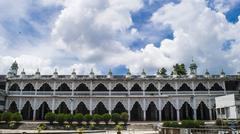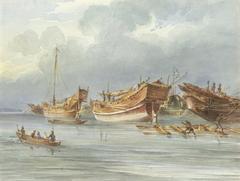Sobhania Alia Kamil Madrasa: Visiting Hours, Tickets, and Comprehensive Guide to Chittagong Historical Sites
Date: 14/06/2025
Introduction
Sobhania Alia Kamil Madrasa, situated in the heart of Chittagong, Bangladesh, stands as a leading institution that harmoniously blends Islamic tradition with modern education. Steeped in history and set amid a vibrant urban landscape, it offers visitors and scholars alike a unique opportunity to experience Bangladesh’s evolving Islamic educational heritage, architectural beauty, and the rich cultural tapestry of Chittagong. This guide provides in-depth information on the madrasa’s historical significance, academic structure, visiting hours, campus facilities, etiquette, and nearby attractions, ensuring a well-prepared and meaningful visit.
Table of Contents
- Introduction
- Historical and Educational Significance
- Campus Overview and Facilities
- Visitor Information
- Nearby Historical and Natural Attractions
- Practical Travel Tips
- Frequently Asked Questions (FAQ)
- Conclusion
- References
Historical and Educational Significance
The Alia Madrasa System: Origins and Evolution
The Alia Madrasa system was established in 1780 in Kolkata during British colonial rule, designed to integrate traditional Islamic studies—such as Quran, Hadith, and Fiqh—with secular subjects including mathematics and science. This innovative approach aimed to modernize Islamic education and remains foundational to Bangladesh’s educational landscape today (bestinbangla.com). Since Bangladesh’s independence in 1971, the Alia system has expanded significantly, now encompassing over 10,450 madrasas and more than two million students nationwide (wikiofinfo.com).
Sobhania Alia Kamil Madrasa: Growth and Development
Located in Pathorghata, Chittagong, Sobhania Alia Kamil Madrasa has evolved into a premier institution for postgraduate Islamic education. Its campus features a harmonious blend of classic Islamic architectural elements and modern amenities, notably enhanced by the Abdus Salam Isapuri academic building inaugurated in 2021 (The Financial Express). The madrasa’s curriculum is continually updated in coordination with the Bangladesh Madrasah Education Board, ensuring both religious and secular subjects are relevant and rigorous (EduportalBD locator).
The Kamil Degree and Its Importance
Offering education up to the Kamil level—equivalent to a master’s degree—the madrasa prepares students for leadership roles in both religious and secular domains. The academic progression follows the Alia curriculum: Ibtedai, Dakhil, Alim, Fazil, and Kamil, integrating advanced Islamic jurisprudence, theology, and modern disciplines (shahfoundationbd.org).
Campus Overview and Facilities
Architecture and Layout
The campus at 15 Asagonj Road, 34 No. Pathorghata, Kotowali, Chittagong, is designed to foster both learning and spiritual growth. Traditional Islamic motifs blend seamlessly with practical modern infrastructure, including multi-storied academic blocks, open courtyards, and a central mosque (EduportalBD locator).
Academic, Administrative, and Residential Facilities
- Classrooms & Lecture Halls: Equipped with modern teaching aids and accommodating 30–50 students per room. Larger halls are used for seminars and events (EduportalBD Kamil List).
- Library: Contains classical Islamic texts, modern academic resources, and digital media. Quiet study zones and extended hours support scholarly research.
- Administration: Centralized offices for admissions, finance, and visitor assistance; a reception desk manages guest queries and tour bookings.
- Hostels: Gender-segregated dormitories with communal dining halls, ensuring safety and a supportive environment for out-of-town students.
- Dining Facilities: Nutritious halal meals are provided in the dining hall, with a cafeteria offering snacks and beverages.
- Prayer Facilities: The mosque is central to campus life, hosting daily prayers, Friday congregations, and religious events.
- Health & Wellness: On-campus clinic for first aid and basic healthcare, with arrangements for emergencies at nearby hospitals.
Student Life and Extracurricular Activities
Students participate in academic clubs (debate, literature, calligraphy), sports, and annual cultural or religious events, fostering leadership and community engagement. The student body is increasingly diverse, reflecting national trends toward greater inclusion of female students (wikiofinfo.com).
Visitor Information
Visiting Hours
- Regular Hours: Saturday to Thursday, 9:00 AM to 5:00 PM.
- Closed: Fridays and major Islamic holidays.
- Note: Hours may change during public holidays or special events; confirm in advance (bd.top10place.com).
Entry Fee and Guided Tours
- Entry Fee: Free of charge; voluntary donations accepted.
- Guided Tours: Available upon request. Contact the administration office in advance to arrange a tour and learn about the madrasa’s history, curriculum, and daily life.
Dress Code and Etiquette
- Dress: Modest clothing is required. Men should wear long trousers and shirts; women should cover arms and legs and wear a headscarf. Shoes must be removed in prayer halls and some classrooms.
- Behavior: Maintain a respectful demeanor, keep noise minimal, and avoid entering during classes or prayers.
- Photography: Permitted in outdoor/common areas. Always seek permission before photographing students or religious activities.
Accessibility and Travel Tips
- Accessibility: The campus is accessible by taxi, ride-sharing apps, and local buses. Some older buildings may have limited wheelchair access; contact the administration for assistance.
- Language: Instruction and communication are primarily in Bangla; some staff may speak English. Using a local guide or interpreter is helpful for non-Bengali speakers.
- Facilities: Restrooms are available but may be basic. Bring water, snacks, and any personal necessities.
Safety and Security
Chittagong is generally safe, and the madrasa is a respected community institution. Security personnel may ask visitors to sign in or provide identification. Keep valuables secure and follow staff guidance.
Nearby Historical and Natural Attractions
Enhance your visit by exploring these top Chittagong sites:
- Bayazid Bostami Mazar: A 9th-century Sufi shrine with a sacred turtle pond (My Global Viewpoint).
- Patenga Beach: Lively beach area popular for sunsets and local cuisine (Trip Bangla).
- Foy’s Lake: Recreational lake with boating and amusement park facilities.
- Chittagong War Cemetery: Memorial for World War II soldiers.
- National Ethnological Museum: Artifacts and cultural exhibits of Bangladesh’s ethnic minorities.
- Chandranath Temple and Hills: Hindu pilgrimage site with panoramic city views (Bangladeshi Heritage).
- Bashbaria Beach and Kaptai Lake: Tranquil natural escapes for relaxation and scenic views (travelvibe.net).
Practical Travel Tips
- Advance Confirmation: Contact the madrasa to confirm visiting hours and arrange tours (bd.top10place.com).
- Best Time to Visit: November to February for cooler, dry weather; avoid monsoon season.
- Language Prep: Learn basic Bangla greetings or hire a local interpreter.
- Cultural Sensitivity: Engage respectfully, avoid interrupting classes or prayers, and follow dress codes.
- Safety: Be vigilant with belongings and comply with security requests.
- Nearby Dining: Sample Chittagong’s mezbani beef, seafood, and street food for an authentic culinary experience (Trip Bangla).
Frequently Asked Questions (FAQ)
Q: What are the visiting hours?
A: Saturday to Thursday, 9:00 AM to 5:00 PM. Closed on Fridays and major Islamic holidays.
Q: Is there an entry fee?
A: No, entry is free; donations are welcome.
Q: Are guided tours available?
A: Yes, by prior arrangement with the administration.
Q: What is the dress code?
A: Modest clothing for all visitors; women should wear a headscarf, men should avoid shorts.
Q: Can I take photographs?
A: Yes, in common areas, with permission for any individuals or religious events.
Q: Is it accessible for international visitors?
A: Yes, but non-Bengali speakers should consider a guide for the best experience.
Q: How do I reach the madrasa from the city center?
A: Easily accessible via taxi, ride-sharing apps, or local buses.
Conclusion
Sobhania Alia Kamil Madrasa stands as a beacon of educational excellence and cultural heritage in Chittagong. Its progressive approach to Islamic education, modern facilities, and community engagement make it a vital institution for both students and visitors. As you explore the campus and nearby historical sites, you’ll gain deeper insight into Bangladesh’s religious, cultural, and academic landscapes.
For up-to-date information, campus maps, and guided tour bookings, visit the EduportalBD locator or download the Audiala app. Enhance your visit by exploring Chittagong’s diverse attractions and immersing yourself in the region’s unique heritage.
References
- The Financial Express
- EduportalBD locator
- bd.top10place.com
- Trip Bangla
- bestinbangla.com
- wikiofinfo.com
- shahfoundationbd.org
- My Global Viewpoint
- travelvibe.net
- Bangladeshi Heritage
- IIU Report
- Chittagong University Journal of Arts and Humanities

